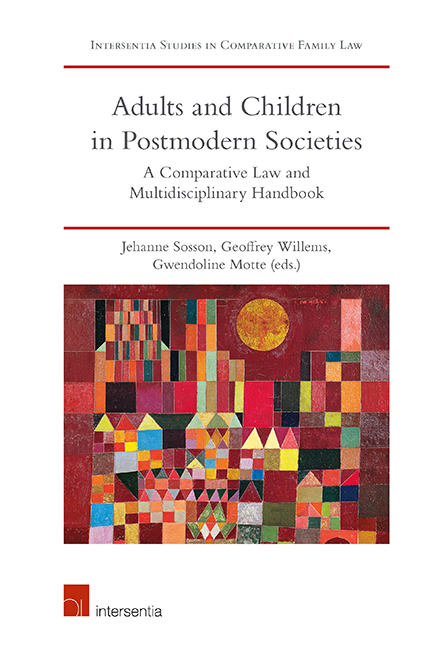Book contents
- Frontmatter
- Contents
- List of Cases
- List of Contributors
- Introduction
- PART I NATIONAL REPORTS ON LEGAL REGULATIONS OF RELATIONSHIPS BETWEEN ADULTS AND CHILDREN
- Questionnaire
- Models
- Algeria
- Argentina
- Australia
- Belgium
- Canada
- Democratic Republic of the Congo
- England and Wales
- France
- Germany
- Ireland
- Italy
- Japan
- The Netherlands
- Romania
- Spain and Catalonia
- Sweden
- Switzerland
- United States of America
- PART II INTERDISCIPLINARY APPROACH
- PART III INTERNATIONAL LAW INSIGHTS
- PART IV COMPARATIVE APPROACH
- General Conclusion: The Challenge of Transparent and Inclusive Parenthood/Parentality in a Pluralist and Cosmopolitan Context
- About the Editors
Canada
from PART I - NATIONAL REPORTS ON LEGAL REGULATIONS OF RELATIONSHIPS BETWEEN ADULTS AND CHILDREN
Published online by Cambridge University Press: 26 June 2019
- Frontmatter
- Contents
- List of Cases
- List of Contributors
- Introduction
- PART I NATIONAL REPORTS ON LEGAL REGULATIONS OF RELATIONSHIPS BETWEEN ADULTS AND CHILDREN
- Questionnaire
- Models
- Algeria
- Argentina
- Australia
- Belgium
- Canada
- Democratic Republic of the Congo
- England and Wales
- France
- Germany
- Ireland
- Italy
- Japan
- The Netherlands
- Romania
- Spain and Catalonia
- Sweden
- Switzerland
- United States of America
- PART II INTERDISCIPLINARY APPROACH
- PART III INTERNATIONAL LAW INSIGHTS
- PART IV COMPARATIVE APPROACH
- General Conclusion: The Challenge of Transparent and Inclusive Parenthood/Parentality in a Pluralist and Cosmopolitan Context
- About the Editors
Summary
The Canadian federation was constituted in 1867, inspired by the American Constitution for its federalist system and by the British government for its parliamentary system and constitutional monarchy. It is now composed of ten provinces and three territories. The key characteristic of the Canadian system is the division of executive and legislative powers between the federal and provincial governments. All laws must respect the Canadian Constitution, including the Canadian Charter of Human Rights and Freedoms. Generally, laws regulating adults and children relationships (e.g. parentage, adoption, filiation) fall under the jurisdiction of the provinces or territories. So these laws vary from one jurisdiction to another. That justifies the overview approach we have chosen to present the rules governing these issues in Canada. The federal government is responsible for formation of marriage and divorce and it also has other general powers such as the criminal law power, the spending power, as well as residual powers over matters not assigned by the constitution to provinces and territories. Some matters could be of concurrent jurisdictions (e.g. surrogacy and artificial reproduction for the criminal law implications). There can be complex interactions at times between provincial/territorial and federal law (e.g. Reference re Assisted Human Reproduction Act, 2010 SCC 61). In the province of Quebec, the civil law system is applicable to relationships between persons and property, inspired by the French Napoleonic code, but the relationship between the state and persons has been governed by the common law of English origin. The common law applies in the rest of Canada, either in private or public matters.
CHANGES IN THE TRADITIONAL FAMILY
A. MOTHERS
1. Is maternity automatically established by the birth certificate?
In general, maternity is automatically established by the act of birth in Quebec (art. 523 CCQ), regardless of the circumstances of the child's birth. The adage mater semper certa est is of application in Quebec civil law. Hence, the woman who gives birth to the child is deemed to be the mother of the child. Nevertheless, a declaration from the mother to the registrar of civil status within 30 days of the birth of a child is still required. Failure to declare within that period of time is subject to a fine.
- Type
- Chapter
- Information
- Adults and Children in Postmodern SocietiesA Comparative Law and Multidisciplinary Handbook, pp. 149 - 186Publisher: IntersentiaPrint publication year: 2019



